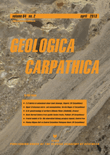
GEOLOGICA CARPATHICA
metrics 2024
Unlocking the Secrets of the Carpathian Region
Introduction
GEOLOGICA CARPATHICA, with ISSN 1335-0552 and E-ISSN 1336-8052, is a distinguished open access journal published by the Slovak Academy of Sciences Geological Institute, serving as a pivotal platform for the dissemination of research in the field of Geology. Established in 1991 and continuing through 2024, the journal is recognized for its significant contributions to Earth and Planetary Sciences, evidenced by its 2023 Scopus ranking placing it in the second quartile (Q2) within Geology. With an H-index that showcases its impactful publications, GEOLOGICA CARPATHICA is committed to fostering scholarly communication while promoting accessible research, having adopted an open access model since 2009. Located in beautiful Bratislava, Slovakia, this journal aims to engage a global audience of researchers, professionals, and students interested in ecological, geological, and environmental studies, making it a prominent resource for enriching the scientific community's understanding of the Carpathian region and beyond.
Metrics 2024
 0.42
0.42 1.00
1.00 1.20
1.20 47
47Metrics History
Rank 2024
Scopus
IF (Web Of Science)
JCI (Web Of Science)
Quartile History
Similar Journals
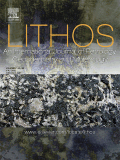
LITHOS
Advancing the Frontiers of Earth Science.LITHOS is a prestigious academic journal published by Elsevier, renowned for its contributions to the fields of Geochemistry and Petrology. As an integral platform since 1968, this journal focuses on advancing the understanding of the Earth's composition and processes, adhering to the highest academic standards as evidenced by its Q1 ranking in both Geochemistry and Petrology, and Geology. With an impressive impact factor and substantial visibility in scientific databases, LITHOS caters to a broad audience, including researchers and students eager to engage with cutting-edge studies. Although it is not an open-access journal, its scholarly rigor and relevance have established it as a leading resource for the latest findings and methodologies in Earth sciences. Notably, it ranks #41 in Earth and Planetary Sciences: Geology and #34 in Geochemistry and Petrology, demonstrating its significant influence within the academic community. The journal is based in the Netherlands and continuously opens avenues for innovative research through its commitment to excellence in the geosciences.
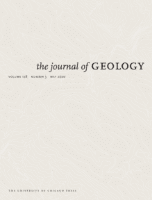
JOURNAL OF GEOLOGY
Advancing Knowledge of Earth's Dynamic Processes.The JOURNAL OF GEOLOGY, published by University of Chicago Press, serves as a premier platform for disseminating groundbreaking research in the field of geology. Established in 1973, this esteemed journal has consistently ranked in the Q2 category in geology, further solidified by its Scopus ranking, where it is positioned at 99 out of 321 in Earth and Planetary Sciences, marking it in the 69th percentile of its category. With an emphasis on innovative and interdisciplinary studies, the journal features peer-reviewed articles that contribute to the understanding of geological processes, earth materials, and environmental interactions. Although it does not currently offer open access, it facilitates broad access through academic institutions to reach a global audience of researchers, professionals, and students striving to advance the knowledge of Earth's history and dynamics. As a vital resource for the geology community, the JOURNAL OF GEOLOGY plays an essential role in fostering scholarly dialogue and advancing both academic inquiry and practical applications in geology.
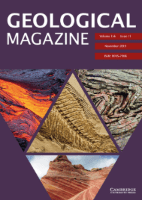
GEOLOGICAL MAGAZINE
Connecting Scholars to the Heart of GeologyGEOLOGICAL MAGAZINE, published by Cambridge University Press, is a premier journal in the field of geology, renowned for its rich legacy since 1864 and ongoing contributions to Earth and Planetary Sciences. With an impressive Q1 ranking in Geology and a Scopus rank of #70 out of 321 journals, it holds a significant position within the academic community, appealing to researchers, professionals, and students alike. The journal covers a wide array of topics, ensuring a comprehensive platform for the dissemination of cutting-edge geological research. Although it does not offer open access, it remains a vital resource for those seeking to stay abreast of advancements in the field. With an enduring commitment to quality, GEOLOGICAL MAGAZINE stands as an essential outlet for scholarly communication and serves as a catalyst for academic discourse within the geological sciences.
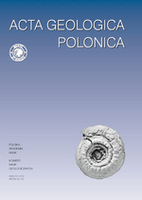
ACTA GEOLOGICA POLONICA
Innovative research shaping the landscape of geology.ACTA GEOLOGICA POLONICA is a distinguished journal published by the Polska Akademia Nauk, in collaboration with the University of Warsaw's Geology Department. Since its inception, it has served as a vital platform for disseminating innovative research in the field of Geology, reflecting a commitment to advancing scientific knowledge in Earth and planetary sciences. With an ISSN of 0001-5709 and an E-ISSN of 2300-1887, this journal provides a rigorous review process and is classified in the Q3 quartile for Geology as of 2023, indicating its growing influence in the discipline. Despite not being open access, the journal facilitates meaningful contributions that span a range of geological topics from fundamental research to applied sciences, thereby enriching the academic landscape. Researchers, professionals, and students alike are encouraged to engage with the valuable findings and discussions contained within its pages, which continue to shape the future of geological inquiry.

GEOLOGICAL QUARTERLY
Fostering Scientific Collaboration in Geology.GEOLOGICAL QUARTERLY, published by the Polish Geological Institute, is a respected journal in the field of geology, offering insights into Earth and planetary sciences since its inception in 2000. With an ISSN of 1641-7291 and an E-ISSN of 2082-5099, this journal serves as a vital platform for researchers, professionals, and students seeking to expand their knowledge in geological disciplines. The journal is positioned in Q3 within the geology category as of 2023 and ranks #172 out of 321 in Scopus, placing it in the 46th percentile among its peers. Although currently not an open-access publication, GEOLOGICAL QUARTERLY reflects the policy of fostering scientific communication and collaboration by disseminating valuable geological research. Its commitment to publishing original articles, reviews, and technical notes ensures that it plays a significant role in advancing geological science and its applications within the academic community. With its base in Warsaw, Poland, the journal stands as an important resource for anyone engaged in or studying the Earth sciences.
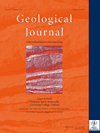
GEOLOGICAL JOURNAL
Advancing geological knowledge through peer-reviewed excellence.GEOLOGICAL JOURNAL, an esteemed publication by WILEY, has been at the forefront of geological research since its inception in 1951. With an ISSN of 0072-1050 and E-ISSN of 1099-1034, this journal serves as a vital platform for disseminating high-quality, peer-reviewed research in the field of geology. Operating out of the United Kingdom, the journal proudly features a Scopus rank of 80 out of 321 in the Earth and Planetary Sciences category, reflecting its commitment to scholarly excellence, with a 2023 category quartile ranking of Q2. As part of its innovative approach, GEOLOGICAL JOURNAL seeks to foster interdisciplinary collaborations, advancing our understanding of earth processes, materials, and history. Although it does not offer open access options, its robust subscription model ensures that both professionals and students have access to groundbreaking insights. With a publication history that spans over seven decades, the GEOLOGICAL JOURNAL continues to be an indispensable resource for the global geological community, encouraging discoveries that shape our comprehension of the planet.
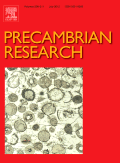
PRECAMBRIAN RESEARCH
Exploring the Foundations of Geochemical and Petrological KnowledgePRECAMBRIAN RESEARCH is a leading peer-reviewed journal published by Elsevier, dedicated to advancing the field of Earth sciences, with a specific focus on the study of the Precambrian era. With its distinguished Q1 ranking in both Geochemistry and Petrology and Geology, this journal plays a critical role in disseminating high-impact research, thus contributing to its impressive standing, ranked in the top percentages in Scopus for related fields. Founded in 1974, the journal has evolved continually, ensuring comprehensive coverage of geological aspects spanning from geochemical processes to petrological studies. Researchers and students alike will find this journal indispensable for accessing cutting-edge findings, methodologies, and innovative perspectives essential for understanding the Earth’s formative years. Although it does not provide an open-access option, its subscription provides a gateway to a wealth of knowledge and groundbreaking research pivotal for scholarly advancements leading up to 2024.
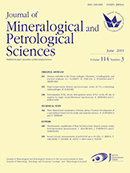
Journal of Mineralogical and Petrological Sciences
Unveiling the Secrets of Geological ProcessesThe Journal of Mineralogical and Petrological Sciences, published by the Japan Association of Mineralogical Sciences, serves as a vital platform for disseminating high-quality research in the fields of mineralogy and petrology. With a presence in both traditional and digital formats (ISSN: 1345-6296; E-ISSN: 1349-3825), this journal fosters scholarly engagement and innovation within these crucial branches of Earth Sciences. As evidenced by its Q3 ranking in both Geology and Geophysics categories for 2023, Journal of Mineralogical and Petrological Sciences maintains a significant standing within the academic community, contributing to the ongoing discourse and exploration of mineralogical phenomena and processes. Researchers, professionals, and students alike will find valuable insights and advancements represented within its pages, with a commitment to inclusivity in research output spanning two decades (2000-2024). Although not currently open access, the journal remains a key resource for understanding the complexities of our geological world.

Gondwana Research
Connecting Experts in Geological Science and InnovationGondwana Research is a premier academic journal published by Elsevier, specializing in the field of geology, with a robust focus on the geological history and processes of the Gondwana supercontinent. With an impressive impact factor and ranking as Q1 in the 2023 Geology category, it stands as a leading platform for disseminating high-quality research. The journal features articles that advance the understanding of Earth and planetary sciences, making significant contributions to geological education and research. Researchers will find its curated content particularly valuable, as it encompasses a wide array of topics including stratigraphy, paleontology, and tectonics, all relevant to both contemporary and historical geological inquiries. Given its substantial reach and esteemed standing—ranked 5th out of 321 in its field—Gondwana Research plays a crucial role in fostering scientific exchange among global experts. Located in the United States with publication continuity from 1997 to 2024, this journal consistently attracts submissions from leading scientists, ensuring that its readership is kept at the forefront of geological discovery and innovation.
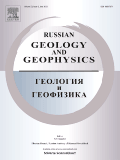
Russian Geology and Geophysics
Exploring the Depths of Geology and GeophysicsRussian Geology and Geophysics is a seminal journal published by GEOSCIENCEWORLD that plays a pivotal role in the dissemination of vital research within the realms of Earth-Surface Processes, Geology, and Geophysics. With an ISSN of 1068-7971 and an E-ISSN of 1878-030X, this journal has witnessed a continuous evolution since its convergence in 2007 and is poised to thrive through 2024. While it is not an Open Access journal, it is recognized for its significant contributions to the academic community, holding a respectable Q2 ranking in Earth-Surface Processes and Q3 rankings in both Geology and Geophysics as of 2023. The journal’s impact factors align it within competitive quartiles, marking it as an essential resource for researchers and professionals seeking to stay at the forefront of geological and geophysical sciences. By publishing high-quality peer-reviewed articles, the journal fosters an environment of knowledge sharing and innovation, making it indispensable for students, practitioners, and scholars alike who are dedicated to advancing our understanding of Earth's complex systems.